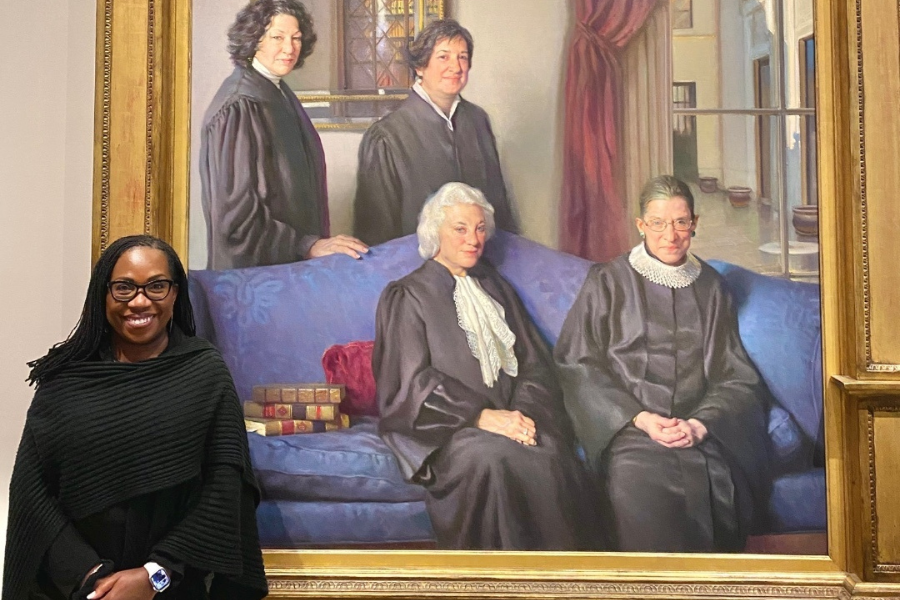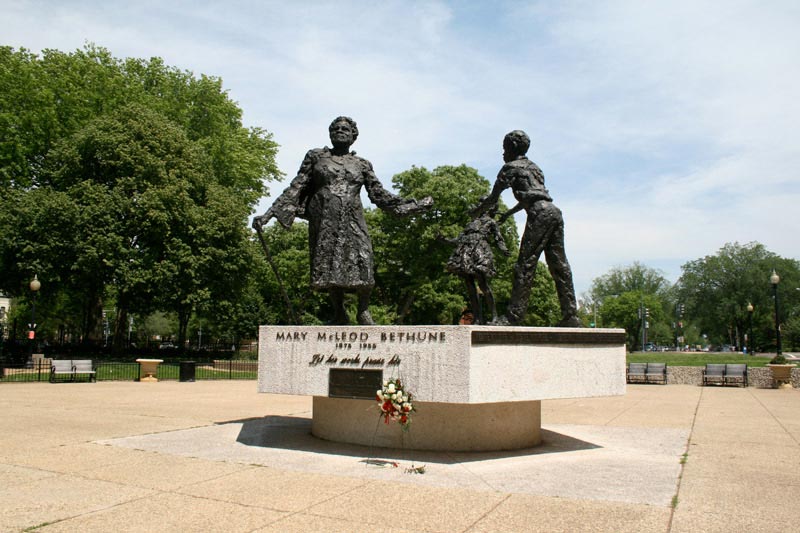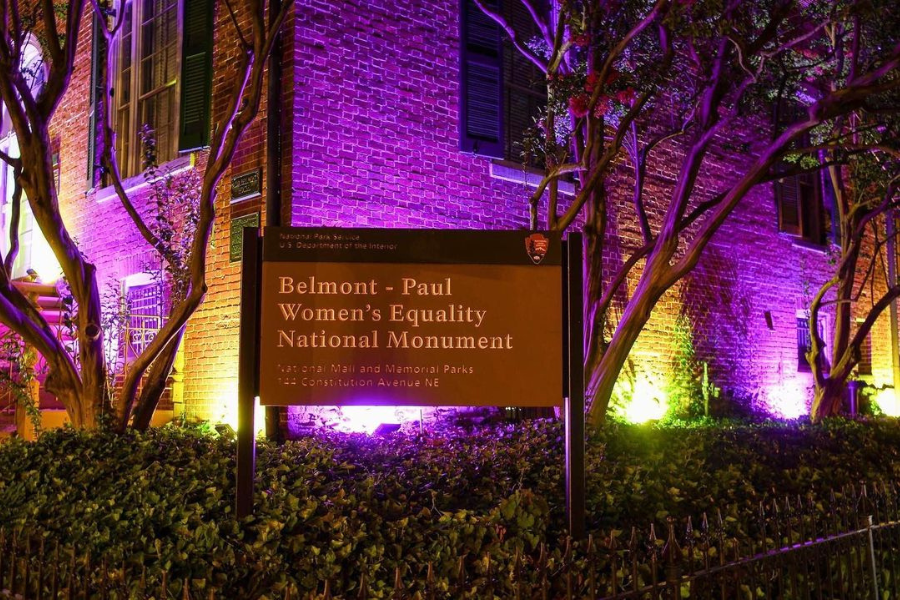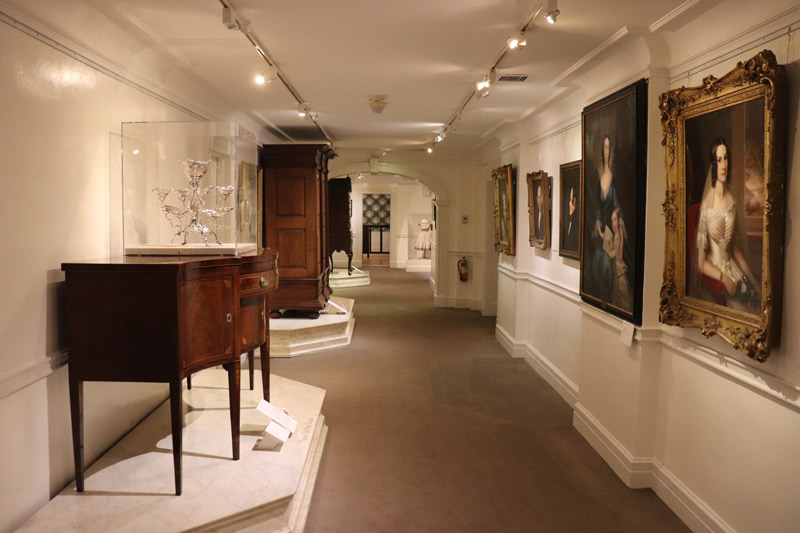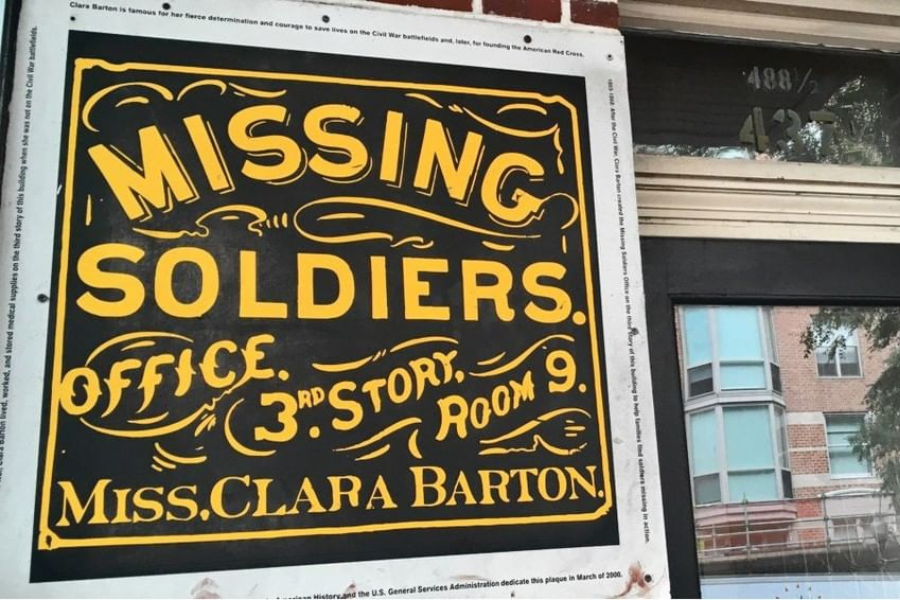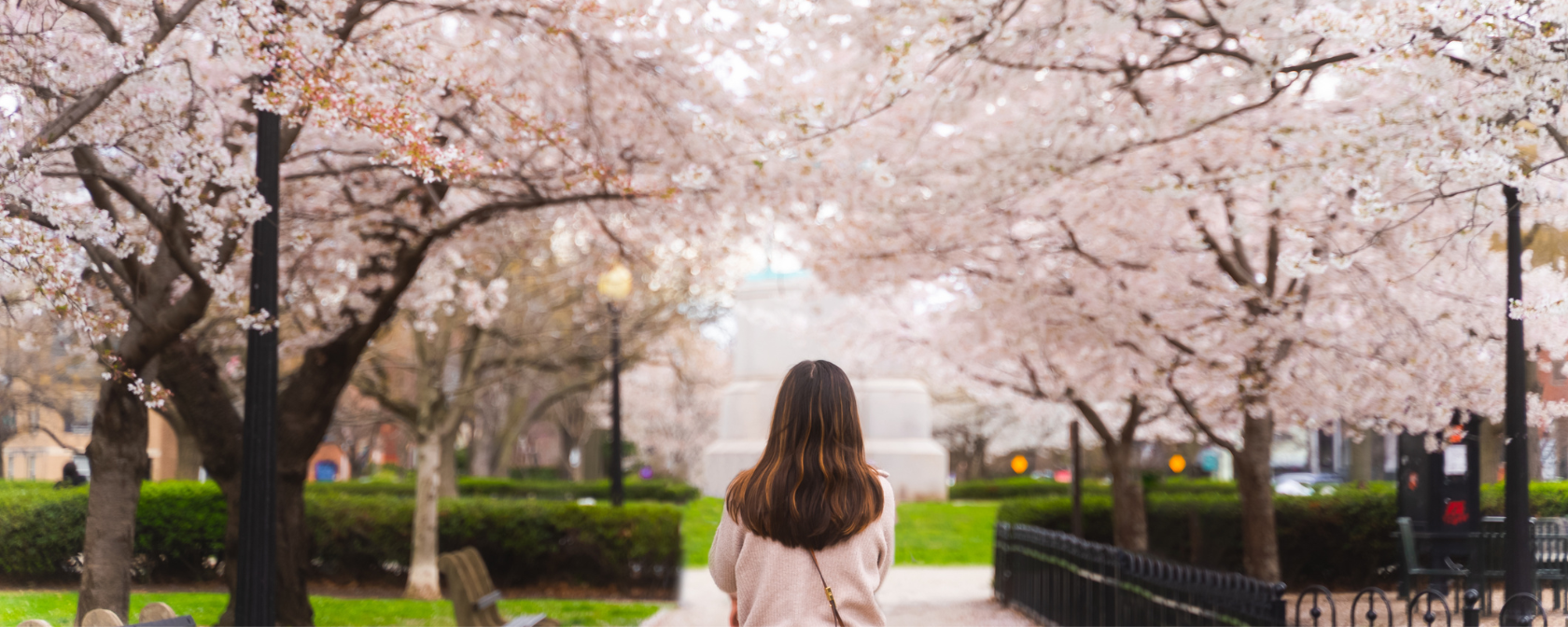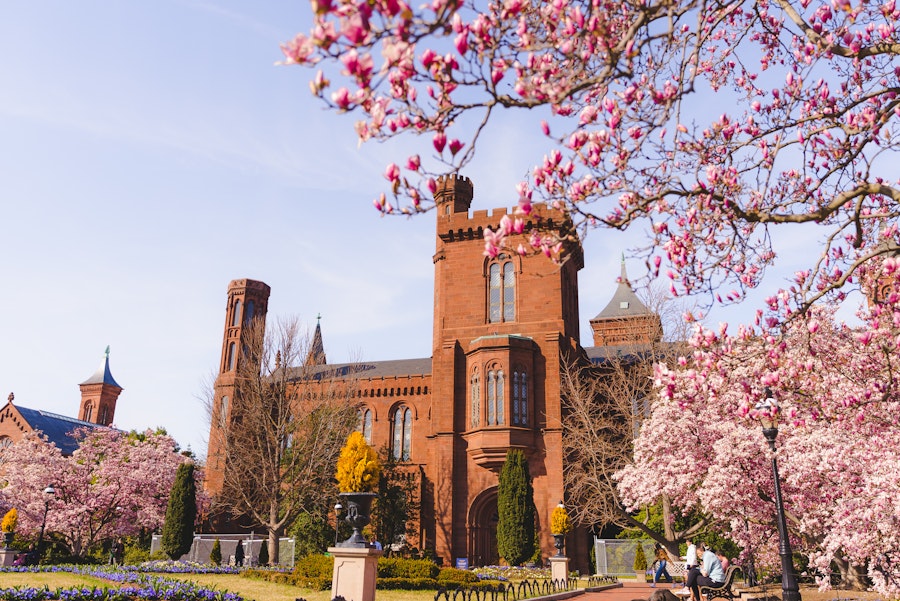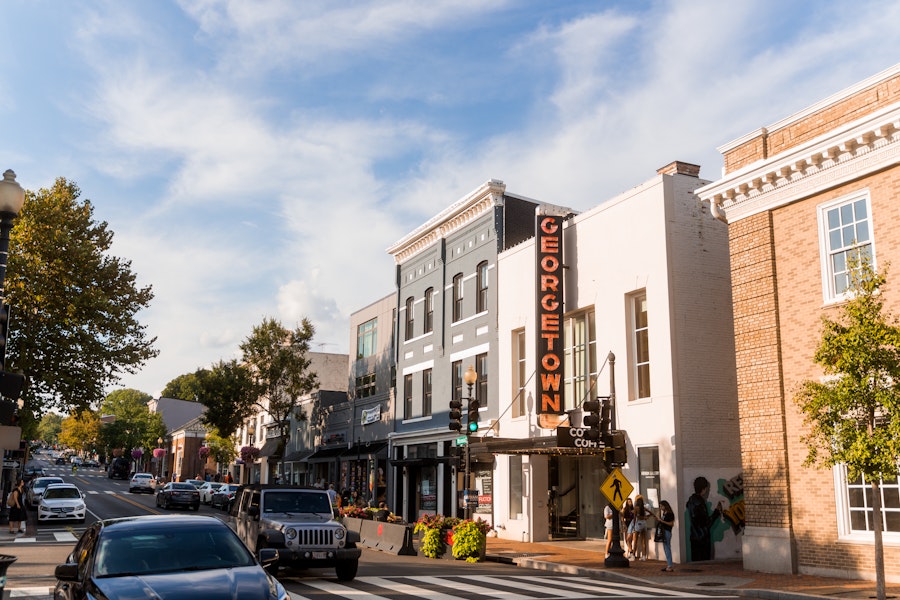MAP IT
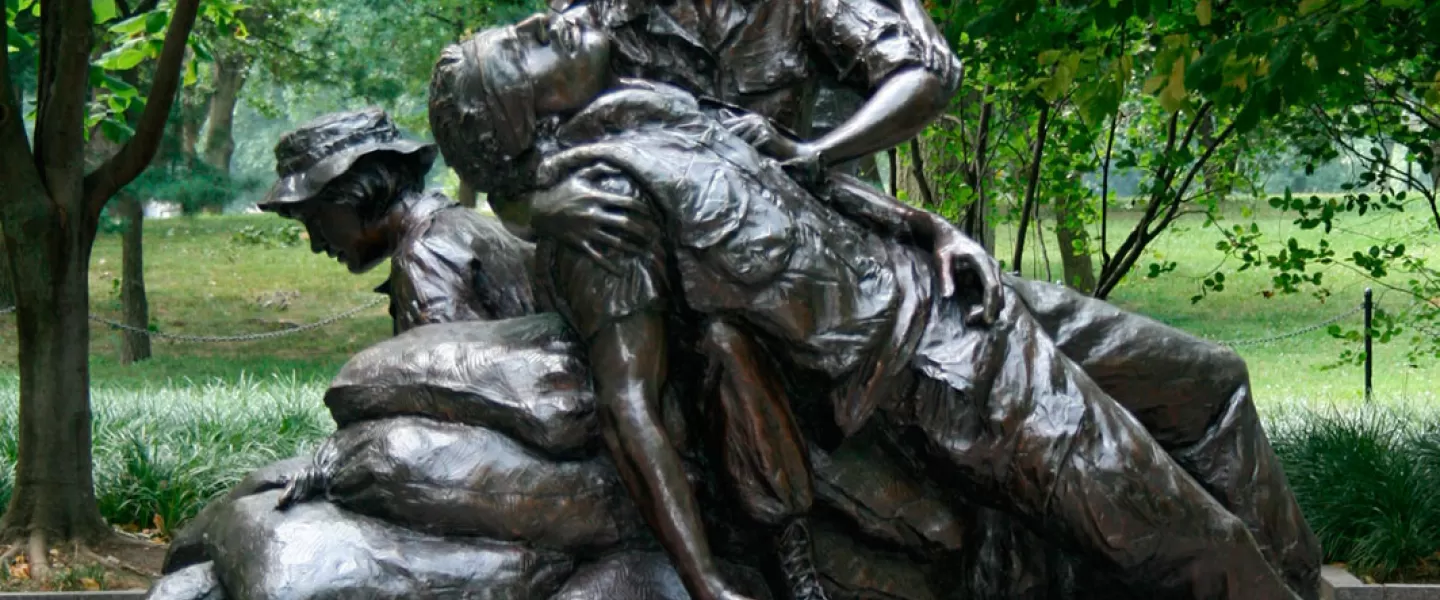
Celebrate Women at These Attractions in Washington, DC
Honor the achievements of women by enjoying these only-in-DC locales.
The nation’s capital has been front and center to some of the most significant moments in women’s civil rights history. From the 1913 Woman Suffrage Procession down America’s Main Street – Pennsylvania Avenue – to the 2017 Women’s March, Washington, DC continues to serve as a fitting backdrop for advocating for the rights of women and recognizing their extraordinary contributions to society.
Be proud of what women have accomplished and check out all these poignant ways to celebrate amazing women in DC, from local and international fame to past and present acclaim.
Looking for more content about amazing women? Check out women-owned businesses, ways to honor influential Black women and women-owned restaurants, bars and bakeries.
01
National Portrait Gallery
For a healthy dose of culture and calm, you can’t beat a wander around the National Portrait Gallery in the Penn Quarter neighborhood. Behind its Greek Revival facade, you’ll discover an incredible collection covering not only U.S. presidents, but also works and special exhibitions highlighting some of America’s most iconic women.
The Scene: The museum's most buzzworthy women's portrait is none other than former first lady Michelle Obama's, unveiled in February 2018. Among other highlights, the gallery features portraits of women’s suffrage activists, including oil paintings of Elizabeth Cady Stanton and Julia Ward Howe, and a bronze bust of Susan B. Anthony. Walk up to the third-floor and explore the mezzanine exhibition, Bravo!, which depicts performing arts legends like Ginger Rogers and Alla Nazimova, or the 20th Century Americans gallery, which highlights Girls Scouts of the USA founder Juliette Low.
Insider Info: At a healthy seven-by-five-and-a-half feet, Nelson Shanks’ The Four Justices salutes to the female Supreme Court justices: the late Ruth Bader Ginsburg wearing one of her iconic jabots (collars) sits next to Sandra Day O’Connor (who retired from the court in 2006) on a blue sofa, while Sonia Sotomayor and Elena Kagan stand behind them in a room based on one in the SCOTUS building. The life-size justices in their robes gaze directly at the captivated viewer, looking altogether like they’re breaking barriers and taking names.
02
National Museum of Women in the Arts
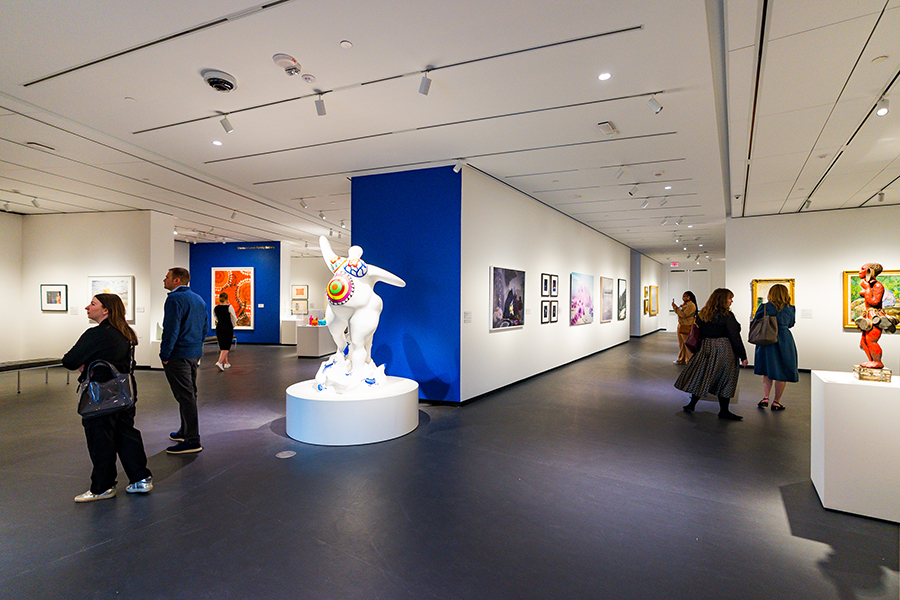
Housed in an old masonic temple famed for its Renaissance Revival style, the National Museum of Women in the Arts is the world’s only museum solely dedicated to celebrating women’s achievements in the visual, performing and literary arts. The museum was founded by art collectors Wilhelmina Cole Holladay and Wallace F. Holladay to showcase the work of female artists spanning the 16th century to the present. The museum recently underwent a renovation, which includes improved interior and exterior spaces, new mechanical systems, enhanced amenities and accessibility, enlarged gallery space and additional research and education space.
The Scene: Head through the Great Hall with its grand white marble staircases and chandeliers to view works by Mexican painter Frida Kahlo, abstractionist Alma Thomas, French figure painter Suzanne Valadon and Baltimore-based painter Amy Sherald, whose strong portrayals of Black women led to her painting the first individual portrait of Michelle Obama (purchased by the National Portrait Gallery).
Insider Info: The museum's gift shop features a curated selection of products, including art books, apparel, jewelry, homewares, beauty items and accessories. Inspired by the museum’s mission to champion women through the arts, the shop only carries merchandise by women-owned and -operated businesses. It also features products created specifically for the shop by local women artists and designers. A portion of shop sales supports exhibitions and education programming at the museum.
03
The Mary McLeod Bethune Council House & Statue
Mary McLeod Bethune was a prominent civil rights activist and organizer who stood up against racial and gender discrimination. The Mary McLeod Bethune Council House, situated near Logan Circle, is where the national political leader founded the National Council of Negro Women. Her home is now a National Historic Site where interpreters share stories of her life and legacy through tours of the house on Thursdays, Fridays and Saturdays. Across town in Capitol Hill, you can also visit a statue dedicated in her honor.
The Scene: The bronze statue features McLeod handing a copy of her legacy to two young black children. It was the first statue on DC public land of either an African American or a woman.
Insider Info: Mary McLeod Bethune is the only woman to have founded a historically Black university. Former vice president Kamala Harris attended DC’s very own HBCU, Howard University.
04
Belmont-Paul Women's Equality National Monument
The National Park Service conducts tours of the Belmont-Paul Women's Equality National Monument, a 200-year-old historic house in Capitol Hill that has been at the center of the fight for women's rights since the National Woman’s Party became the owner in 1929. Guests can learn about the origins of the suffrage and women’s rights movements, including the women who earned the right to vote and introduced the Equal Rights Amendment.
The Scene: Built in 1800, the brick federal-period house is among the oldest residential properties in Washington, DC. The house also functioned as a hotel and second home for some party members until the 1990s.
Insider Info: The house is named after the party’s founder, Alice Paul, as well as Alva Belmont, the largest benefactor of the party at the time the headquarters was constructed.
05
Vietnam Women's Memorial
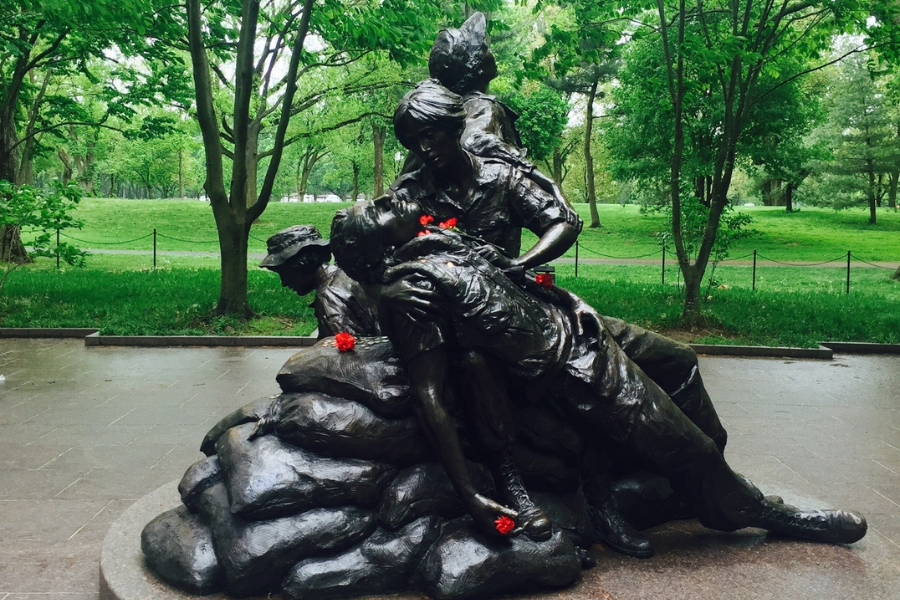
Among the 11,000 women – most of whom were nurses – stationed in Vietnam during the war, Diane Carlson Evans served with the Army Nurse Corps in hospitals in Vung Tau and Pleiku, caring for burn victims and casualties from the field. Following the dedication of the Vietnam Veteran’s Memorial Wall (designed by a 21-year-old Maya Lin) in 1982 and The Three Soldiers statue two years later, Carlson Evans felt uneasy that women had not had their service commemorated. In 1984, she co-founded the Vietnam Women’s Memorial Foundation to recognize the contribution of women during the war.
The Scene: Made by sculptor Glenna Goodacre, the under-the-radar bronze statue sits close to the other Vietnam memorials, and features four figures: Three uniformed women and a dying soldier lying in the arms of one, a contemplative and respectful reminder of the service women gave our country.
Insider Info: The Foundation spent seven years in front of various commissions and Congress before permission was given for the memorial. In 1993, almost a decade after she’d started, Carlson Evans attended the unveiling of the Vietnam Women’s Memorial.
06
Mary Church Terrell House
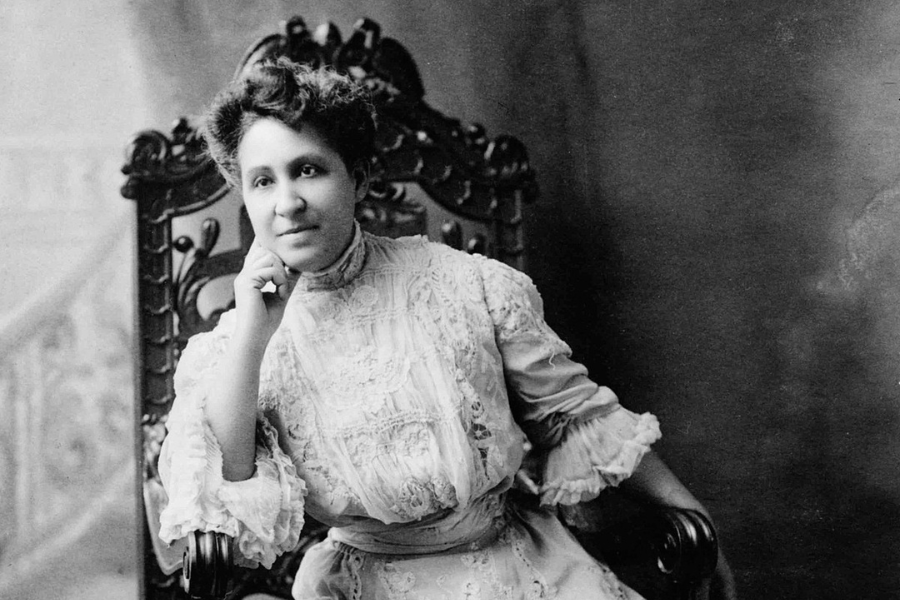
The Northwest DC home belonged to Mary Church Terrell: teacher, principal and civil rights pioneer who began working with the women’s movement after relocating to DC. After initially being shut out due to her race, Terrell went on to help form the National Association of Colored Women (NACW). She later became the president of NACW and continued to fight for the women’s movement and complete work with the NAACP.
The Scene: Projects through the African American Civil Rights Grant Program and the Save America's Treasures Grant Program have both funded work to rehabilitate the Mary Church Terrell House, which is a National Historic Landmark.
Insider Info: Terrell was a named party in the lawsuit that struck down segregated dining in DC, filed after she was refused service in a segregated restaurant. She was also the first Black woman in the United States appointed to a school board, serving on the District of Columbia Board of Education.
07
Hillwood Estate, Museum & Gardens
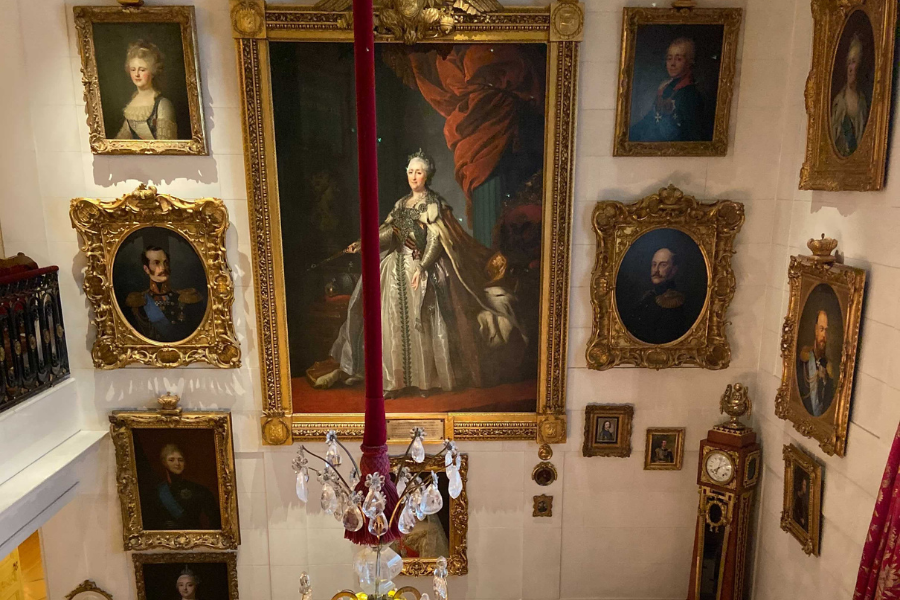
Overlooking Rock Creek Park, the sprawling Hillwood Estate, Museum & Gardens offers a pastoral respite from the fast-paced hubbub of the city. Built in the 1950s by businesswoman and socialite Marjorie Merriweather Post, owner of General Foods, the property features 13 acres of stunning formal gardens and a museum. For ticket information, visit Hillwood's website.
The Scene: You’ll be taken around the world and back when you check out the full grounds and explore all of the “outdoor rooms.” Stroll through Japanese- and European-style gardens, cutting flower gardens and wooded footpaths. While you’re at it, admire the colorfully trimmed wooden Russian cottage and an orchid-laden greenhouse.
Insider Info: After the death of her father when she was 27, Post inherited his business and went on to become one of the wealthiest women in the country. Over time, she assembled an impressive collection of eighteenth-century French porcelain which is housed in the property’s Museum, along with the largest collection of Russian Imperial art outside of that country. Visit the house to see stunning Fabergé objects, religious icons and decorative French objets d’art, and then pick up lunch to-go at the Merriweather Café.
08
The Daughters of the American Revolution Museum & Archives
Observe how members of DAR took advantage of increased opportunities for women to participate in social reform activities, in turn helping to make the dream of women’s voting rights a reality. Discover biographies, correspondence and photographs from the DAR archives that highlight the tremendous accomplishments of more than 40 women. If you can't visit in person, you can virtually explore past and current exhibitions and take an online tour.
The Scene: Get an idea of how Americans lived when the United States was new through 31 period rooms, each decorated to look like a specific time and place in American history. The rooms range in date from 1690-1930.
Insider Info: The main gallery features an exhibit that changes annually, and the study gallery allows for visitors to get close to museum objects.
09
National Museum of American History
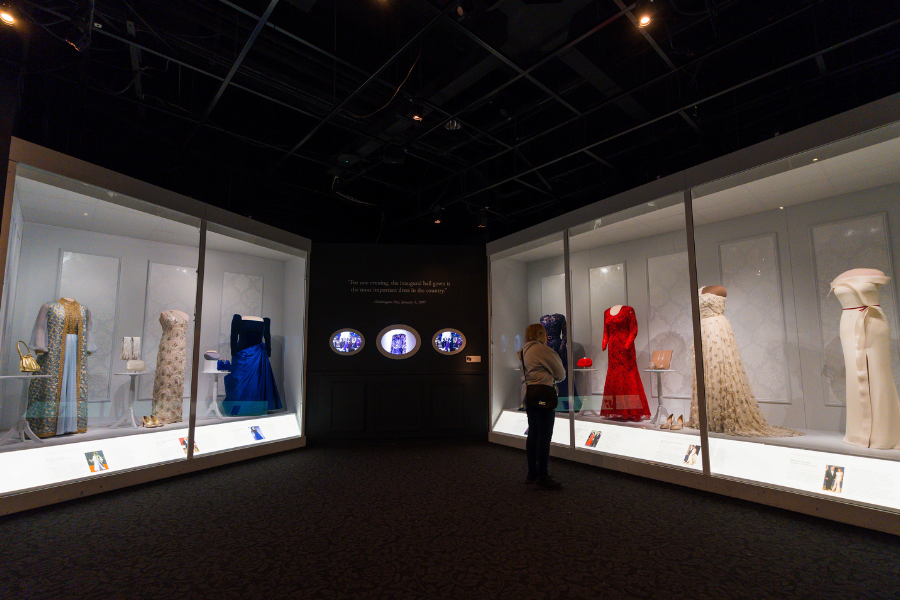
So many of America’s treasures are housed in this vast Smithsonian museum on the National Mall that it’s hard to know where to start. As you’re making the rounds to view the original Star-Spangled Banner, the lunch counter from the Greensboro sit-ins, Abe Lincoln’s top hat and the droids from Return of the Jedi, don't miss a number of exhibits and artifacts that focus on notable women.
The Scene: An exhibition featuring more than two dozen dresses belonging to the nation’s first ladies commemorates more than the clothes they wore; the Changing Times, Changing First Ladies section spotlights the evolving roles and important contributions these women have made to the country.
Insider Info: On the ground floor you can visit Julia Child’s remarkable kitchen – the real one, not a replica – donated by the doyenne of French cuisine herself, with all of its copper pans and taller-than-usual counters (Child was 6’ 2”).
10
National Museum of African American History & Culture
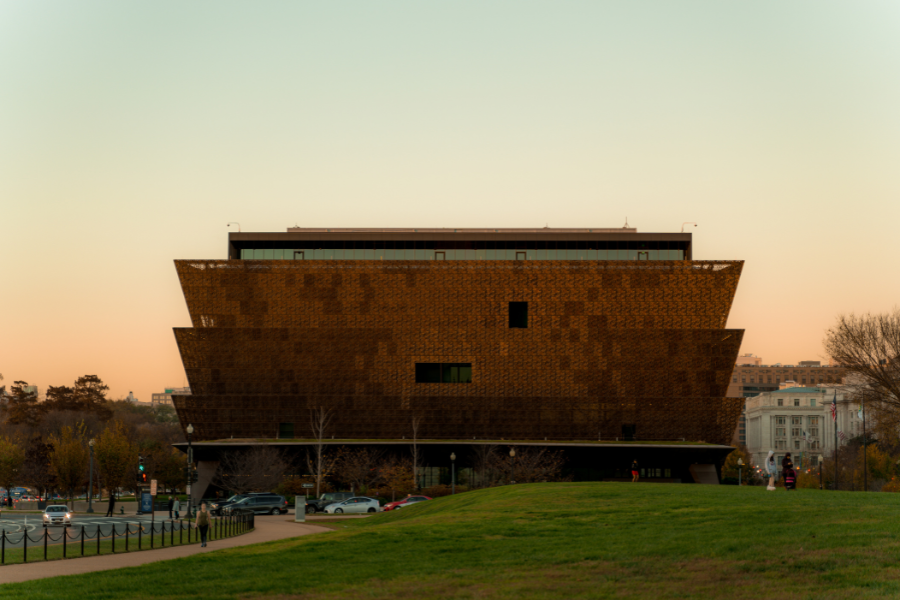
The National Museum of African American History & Culture opened in September 2016 and quickly become one of the city’s hottest tickets. Inside the five-level structure you’ll find a trove of artifacts, from the earliest days of the slave trade to the Jim Crow era to the Civil Rights and Black Lives Matter movements.
The Scene: Be on the lookout for items owned by Harriet Tubman, including a shawl given to her by Britain’s Queen Victoria; the dress that Rosa Parks was sewing when she refused to give up her bus seat; Gabby Douglas’ gymnastics equipment; a uniform worn by Brig. Gen. Hazel Johnson-Brown, who became the first female African American general; statues of Venus and Serena Williams; the couch from The Oprah Winfrey Show and images of women who were instrumental in the Black Power movement and the birth of hip-hop.
Insider Info: The museum requires free timed-entry passes to enter, which you can acquire online. We recommend you plan ahead and obtain advance timed entry passes.
11
The Mansion on O & O Street Museum
During her visits to DC from 1994 to 2003, civil rights icon Rosa Parks spent much of her time at The Mansion on O & the O Street Museum. The historic site pays homage to Parks in the form of a dedicated tour, which features a short film that details her relationship with the Mansion.
The Scene: The O is located in a series of five interconnected town houses that includes more than 100 rooms and over 70 secret doors.
Insider Info: In 1994, Founder of The O Museum in The Mansion, H.H. Leonards, invited Parks and her close friends to stay for free as part of The O Museum’s Heroes-in-Residence Program after they had been attacked and needed a safe place to stay.
12
Clara Barton Missing Soldiers Office Museum
One of the most significant women in American history, Clara Barton founded and served as president of the American Red Cross in 1881. She not only helped to provide assistance to wounded soldiers on the battlefield during the Civil War, but she also assisted many more by founding the Missing Soldiers Office, which helped locate more than 22,000 soldiers of some 63,000.
The Scene: Outside the Clara Barton Missing Soldiers Office Museum you’ll find a replica of the original sign, which hung in the mid-1860s, notifying visitors that they’ll find the office on the third story, room nine. The sign sets the scene for what’s to come: a journey up a narrow staircase transporting you back in time thanks to preserved rooms with era-appropriate wallpaper, faux gas lanterns and windows overlooking 7th Street.
Insider Info: Reservations can be made in advance online. Hours for walk-ins are Thursday – Saturday, 11 a.m. – 5 p.m. Group tours are offered for 10–60 people.
13
Mt. Zion-Female Union Band Society Cemeteries
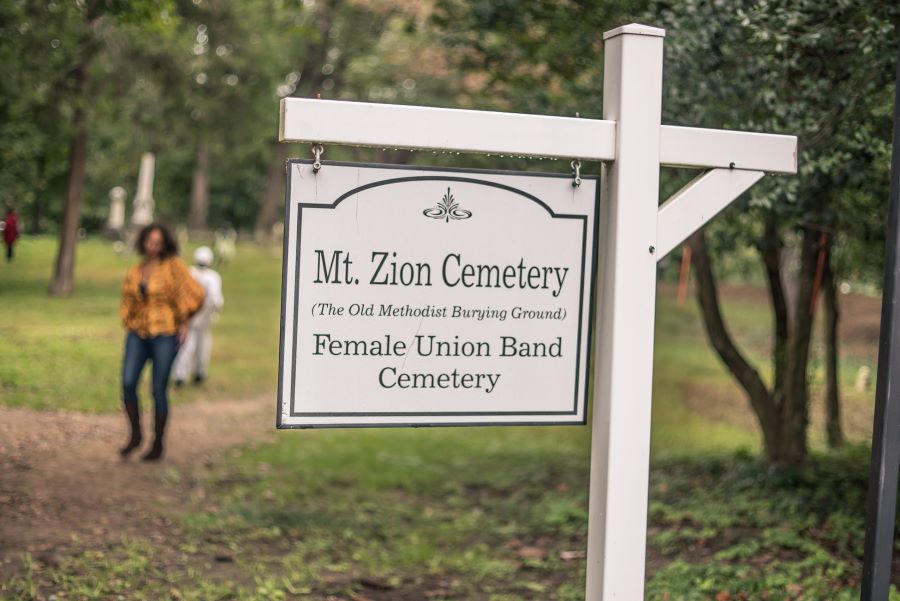
Mt. Zion-Female Union Band Society Cemeteries
Right in Georgetown are two of the oldest remaining African American cemeteries in the DC area. The Female Union Band Society (FUBS) was created by free Black women in 1842 to look after each other “in sickness and in death.” At this extraordinary site, you can pay respects to thousands of women and families, most of whom were enslaved nearly 200 years ago.
The Scene: The way you can walk right up to this sacred ground off Montrose Walk on R Street in Georgetown is breathtaking. There are no barriers; if you just follow the street back a little you’ll see signs welcoming you to the cemetery. There, among the tombstones, you’ll find plenty of benches for sitting and reflecting. The FUBS plot sits atop a hill with a view of part of Rock Creek Park and into the neighboring Oak Hill Cemetery, so you’ll be in one of the quietest spots you can find in the city.
Insider Info: We’ve got two. First, you can find the particularly beloved grave here of “Nannie,” a child who died at age seven in 1856. Many people bring toys, flowers or dolls, wondering whether Nannie was a slave or free, and trying to imagine what her life in 1800s Georgetown would have been like. Tip two: The vault at the FUBS cemetery, which you can walk up to and into, is rumored to have been a stop on the Underground Railroad. A visit here is a haunting way to pay tribute to another of history’s most remarkable women: Harriet Tubman.

